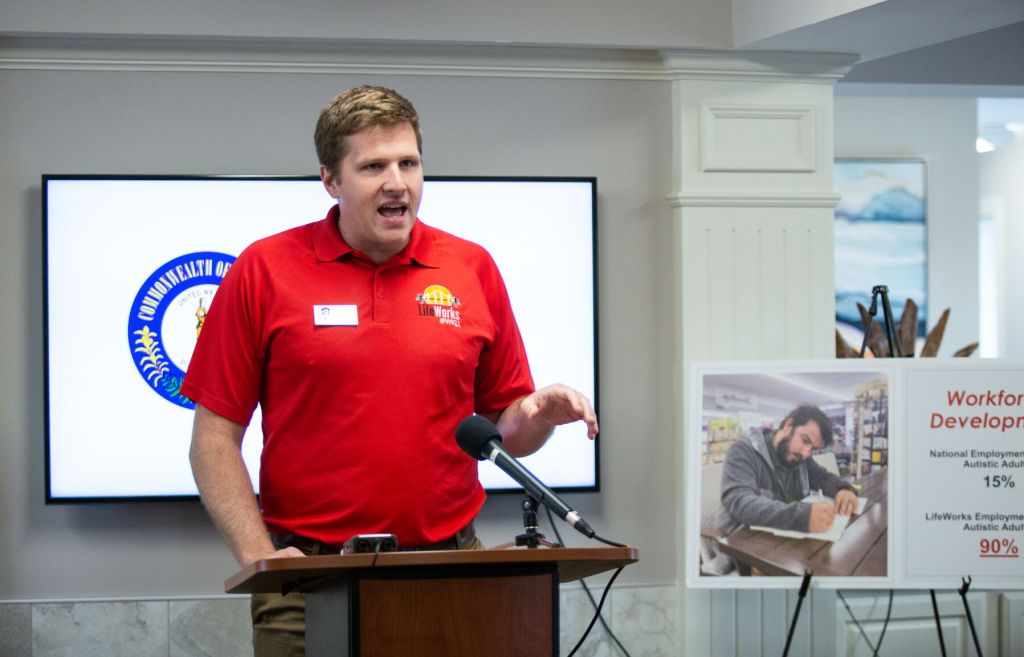LifeWorks accepts $4.4 million state investment for autism support
Published 6:00 am Wednesday, May 1, 2024

- Hendrix Brakefield of LifeWorks at WKU speaks about the $4.4 million in funding awarded to the non-profit by the Commonwealth of Kentucky to support its two-year living and learning Transition Academy and to expand services through its Bridge program for autistic young adults on Tuesday, April 30, 2024. (Grace Ramey/grace.ramey@bgdailynews.com)
LifeWorks at WKU accepted Tuesday a $4.4 million transfusion of state funds to expand services offered to young adults with autism.
Kentucky lawmakers, including Sens. Mike Wilson, R-Bowling Green, and Max Wise, R-Campbellsville, as well as State Reps. Shawn McPherson, R-Scottsville, Robert Duvall, R-Bowling Green, and Kevin Jackson, R-Bowling Green, joined LifeWorks staff and participants at its Adams Street facility to celebrate.
“I look at (LifeWorks) and I think, this is a model for the state of Kentucky – and not only for the state of Kentucky, but for the United States of America,” Wilson told attendees. “Because there is so big a need that is happening, and what you guys are doing here is incredibly important.”
The General Assembly’s investment allocated in the biennial budget will help support the organization’s two-year Transition Academy and Bridge Program services.
Transition Academy offers adults a shared living space on LifeWorks’ campus with guided learning in employability, health, relationship skills and more to develop independence and self-direction.
National employment rates for adults with autism are roughly 15%, according to LifeWorks, but program participants average a 90% employment rate thanks to their guidance, community partnerships and outreach.
The Bridge Program offers similar opportunities for guidance, volunteering and academic success to participants living away from the campus in partnership with South Central Kentucky Community and Technical College.
LifeWorks Program Director Hendrix Brakefield told the Daily News the investment into these efforts ensures continued sustainability – something that is not easy for an organization as unique and new as LifeWorks.
“We recognize there’s a great need for us to have a funding stream that keeps us alive without taxpayer support. However, nothing else exists like LifeWorks,” Brakefield said. “The only downside to that is that there are no funding sources that are already available to us.”
LifeWorks accepted its first Transition Academy cohort in late 2020. Brakefield said it is still in a period of “figuring out” how to keep the operations stable well into the future.
The state’s investment not only gives it time to work, it also helps improve accessibility to people across the country, Brakefield said.
“More than anything, this money is going to allow us to serve more people, to be accessible to more people, to continue to improve our processes and frankly, to expand this outward from Bowling Green,” he said. “While I’m proud of what Bowling Green has, we don’t need to have everybody coming here from all over the world. Every community could have this same kind of thing and there are individuals who would benefit from this all over.”
He said the living-learning model could be applied across communities by other groups.
Several lawmakers in attendance spoke of family experiences with autism. Wilson’s grandson and McPherson’s child have both been diagnosed on the autism spectrum, each said.
Duvall’s son, too, is diagnosed on the spectrum. After his family found out, they sought help from the Kelly Autism Program, which eventually gave birth to the modern LifeWorks program.
“As young parents, there’s a lot of concern, there’s a lot of worry, there’s a lot of confusion, and so … we turned to the John Kelly Autism Center,” Duvall said. “We got answers, we got help and we got a foundation that put our minds at ease and it created the building blocks that help make my son successful, and he is doing well.”
Wilson told the Daily News that John Kelly, namesake of the Kelly Autism Program, and Suzanne Vitale, namesake of Western Kentucky University’s Suzanne Vitale Clinical Education Complex, led the charge in advocating to lawmakers for the $4.4 million investment.
Kelly and Vitale, both of whom were present Tuesday, have been supporters of autism services across the region for decades.
The pair made regular trips to Frankfort during the last legislative session, meeting with each lawmaker to make the case for investment. Wilson called their efforts a “great thing” – “casting the vision, meeting people, building relationships” with “persistence and kindness.”
Wilson said the common phrase in Frankfort during the session was “return on investment” – lawmakers wanted to fund projects they knew would see results.
Through conversations with Kelly and Vitale and after meeting program participants at Tuesday’s event, he is confident in the state’s investment.
“The return on investment is going to be huge in terms of families and in these children and for the state of Kentucky, because these children would no longer be dependent upon the state and would be productive citizens – working, earning a living, living independently – for themselves,” Wilson said.






